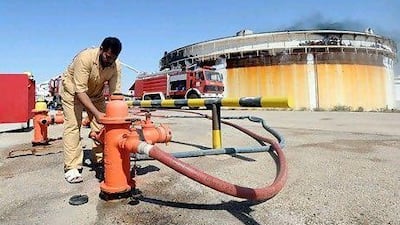Standing in front of the rebel flag at the newly reopened Libyan consulate in Dubai, the new minister of infrastructure and reconstruction represents both past and present.
Industry insights What now for Libya?
Day long in coming has arrived Libya's oil industry lies in the hands of a former economics professor and long-time critic of the Qaddafi regime. Read article
UAE a much needed powerful ally As Libya rebuilds it is counting on the UAE for fuel, infrastructure experience and energy investment. Read article
Infighting at Opec opens up rifts The Libyan conflict exposed rifts between producers and consumer, and even within Opec. Read article
Ahmed Jehani began his career in the 1960s, specialising in the technical aspects of oil production. For nearly a decade after that he served as general counsel for the Libyan National Oil Corporation, the state oil company under Muammar Qaddafi's regime.
Now he is tasked with helping to restart the oil pipelines and repair the refineries that, before the civil war, provided Libya with nearly all of its income.
His history illustrates the Catch-22 of restarting Libya's oil industry: to build a country without Col Qaddafi, Libya must rely on those who built it with him.
Mr Jehani outlined his plan for reviving Libya's pre-conflict oil production, which he said could be achieved in a year.
The strategy - welcoming back former foreign players, honouring Qaddafi-era contracts and keeping Opec quotas intact - signalled a strategy more pragmatic than revolutionary.
"Part of our policy of stabilisation is not to cause disruptions," he said. "The council is in caretaker mode. What we do will be conservative."
The speed at which the National Transitional Council (NTC) can get pipelines flowing again is critical to maintaining the rebel government, which said on Thursday that unless foreign governments unlocked more frozen assets it could run for only two more weeks. Before the conflict, oil and gas accounted for an estimated 80 to 92 per cent of government revenue.
Restarting the oil industry also has consequences for the global economy. An Opec member, Libya once supplied 2 per cent of the world's oil, and the loss of its high-quality crude from the market helped to send the price of Brent, the European benchmark, as high as US$127 a barrel in April.
Estimates of how soon Libya can regain pre-conflict capacity range from six months to the three years predicted by the energy consultancy Wood Mackenzie.
Ali Tarhouni, the rebel government's oil minister, has predicted that 500,000 to 600,000 bpd - about one third of the pre-conflict target - could be reached in two to three weeks.
"What Libya doesn't face is the same situation as Iraq, where the oil infrastructure had been destroyed," said Edward Hobart, the British deputy ambassador to the UAE, who headed the foreign office's Libya desk during the conflict.
But during the six months that oil installations lay idle, pipelines may have been clogged by sludge or oilfields may have lost pressure, others worry.
"The remaining few hundred thousand of capacity might take a longer time to bring back onstream, given the hasty and disorderly shut-downs of mature oilfields, which in many cases were in a relatively bad and neglected state even before the war began," wrote Samuel Ciszuk, the senior energy analyst at IHS Global Insight in London.
To solve those technical problems, the rebels are counting on the same foreign oil companies that once pumped oil with the blessing of the Qaddafi regime.
Eni, the Italian oil company that was Libya's biggest foreign investor and once drew about 13 per cent of its revenue from Libya, says it has spoken daily with the NTC since April.
In turn, the rebels have said the production-sharing agreements agreed before February would be honoured and that Libya would not seek new oil partners until after a democratic government was elected.
That helped to assuage fears the rebels would redraw the production map on the basis of military aid during the civil war - a task that would require lengthy negotiations and scare off foreign companies, said Mr Ciszuk.
"It would also unsettle other oil companies and send a signal that the Libyan oil business would continue to be highly politicised - just as under the previous regime," he wrote.
Even so, a revised map might not have looked too different from the old.
Many of the producers - Eni as well as the UK's BP, France's Total andMarathon and Conoco of the US - came from nations that were among the most active in supporting the uprising.

